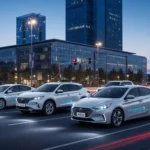Hybrid vehicles are a revolutionary force in the automotive industry, bridging the gap between traditional internal combustion engines and electric vehicles. This comprehensive exploration examines the intricacies of Hybrid Vehicles, elucidating their fundamental principles, key components, recent innovations, notable applications, and their transformative impact on advancing a greener, more fuel-efficient future.
Understanding Hybrid Vehicles
Hybrid vehicles represent a significant shift in automotive technology, combining the benefits of conventional internal combustion engines with electric propulsion. At their core, hybrid vehicles employ a dual power system, typically comprising an internal combustion engine and an electric motor. This combination optimizes fuel efficiency, reduces emissions, and improves performance relative to traditional vehicles.
Key Components of Hybrid Vehicles
The core components of hybrid vehicles contribute to their functionality, efficiency, and overall performance:
- Internal Combustion Engine: A traditional gasoline or diesel engine forms the backbone of hybrid vehicles, providing power during high-demand situations or when the electric power is depleted.
- Electric Motor: The electric motor, often powered by a battery pack, operates in conjunction with the internal combustion engine. It assists at low speeds and during acceleration and operates independently in electric-only driving modes.
- Battery Pack: Hybrid vehicles feature a rechargeable battery pack that stores electrical energy generated through regenerative braking and excess power from the internal combustion engine. This stored energy powers the electric motor and enhances overall fuel efficiency.
Recent Innovations in Hybrid Vehicle Technology
Recent innovations have propelled hybrid vehicle technology to new heights, addressing key challenges and pushing the boundaries of performance:
Plug-In Hybrid Electric Vehicles (PHEVs)
Plug-in hybrid electric vehicles allow users to charge the battery using an external power source, providing an extended electric-only driving range. This innovation addresses users seeking a balance between electric driving and the flexibility of a combustion engine for longer journeys.
Regenerative Braking Systems
Advancements in regenerative braking systems capture and convert kinetic energy during braking into electrical energy, which is then stored in the battery. It improves fuel efficiency and enhances the overall sustainability of hybrid vehicles.
Predictive Energy Management
Sophisticated algorithms and predictive energy management systems analyze driving conditions and driver behavior to optimize electric and combustion power use. It maximizes efficiency and minimizes emissions across various driving scenarios.
Notable Applications of Hybrid Vehicles
Hybrid vehicle technology finds applications beyond personal transportation, contributing to various sectors and industries:
Urban Commuting
In congested urban environments, hybrid vehicles excel by seamlessly switching between electric and combustion power. This versatility reduces fuel consumption and emissions during stop-and-go traffic, making hybrid vehicles ideal for urban commuting.
Fleet Vehicles
Hybrid technology is gaining popularity in fleet management, particularly for delivery vehicles and taxis. The dual power system provides economic benefits through fuel savings and lower emissions, aligning with corporate sustainability goals.
Off-Road and Industrial Applications
Hybrid technology extends to off-road vehicles and industrial equipment, where the combination of electric and combustion power enhances torque and operational efficiency. Hybrid solutions are increasingly used in construction equipment, agricultural machinery, and other heavy-duty applications.
Challenges in Hybrid Vehicle Technology
While hybrid vehicle technology has witnessed significant advancements, several challenges persist, impacting widespread adoption and efficiency:
Cost and Affordability
The initial cost of hybrid vehicles is higher than that of traditional vehicles due to the added complexity of dual-power systems and advanced technologies. Addressing this challenge is crucial for making hybrid technology accessible to a broader consumer base.
Charging Infrastructure
Plug-in hybrid electric vehicles rely on charging infrastructure for optimal performance. A comprehensive and easily accessible charging infrastructure is essential to encourage the widespread adoption of plug-in hybrid technology.
Battery Technology and Longevity
The durability and longevity of hybrid vehicle batteries pose challenges. Continuous research into battery technology and recycling methods is necessary to address environmental impact and long-term reliability concerns.
Future Trends in Hybrid Vehicle Technology
As technology continues to advance, the future of hybrid vehicles promises exciting trends that will further redefine the capabilities and applications of dual-power systems:
Enhanced Battery Technology
Ongoing research into advanced battery technologies, including solid-state batteries, aims to improve energy density, reduce charging times, and enhance the overall performance of hybrid vehicles. These advancements will address concerns related to battery longevity and contribute to the sustainability of hybrid technology.
Increased Vehicle Electrification
The trend toward increased vehicle electrification includes the integration of additional electric components into hybrid vehicles. It may involve electrified powertrains, advanced driver-assistance systems, and connectivity features that further enhance the efficiency and user experience of hybrid cars.
Government Incentives and Regulations
Growing environmental awareness and governmental initiatives to reduce emissions will likely lead to increased incentives and regulations favoring hybrid and electric vehicles. It will encourage manufacturers to invest more in hybrid technology and drive the adoption of greener transportation solutions.
Conclusion
Hybrid vehicles stand at the forefront of the automotive industry’s transition towards more sustainable and efficient transportation. From urban commuting to industrial applications, the impact of hybrid technology extends across various sectors. Despite existing challenges, ongoing innovations in plug-in hybrid technology, regenerative braking systems, and predictive energy management signal a promising future for hybrid vehicles. As research continues to push the boundaries of what is possible, hybrid vehicles are poised to serve as a transitional solution and a lasting contributor to a more environmentally friendly and fuel-efficient automotive landscape.





